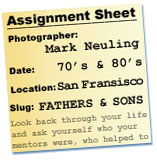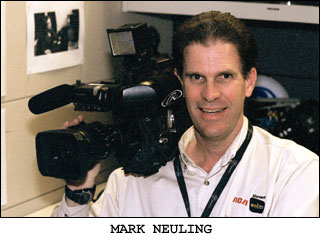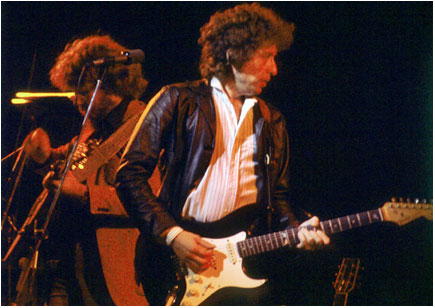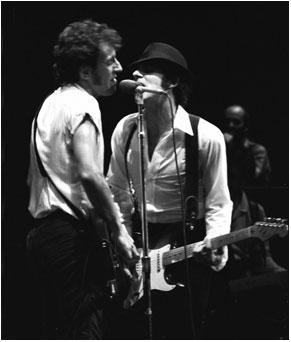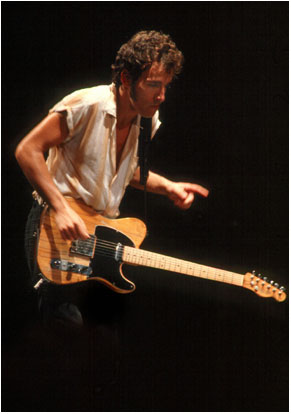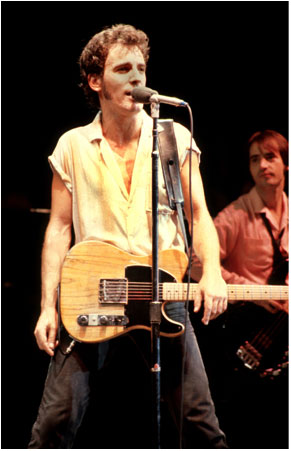FATHERS AND SONS
By Mark Neuling
Field Camera Operator for TechTV
Look back through your life and ask yourself who your mentors were,
who helped to mold and influence me? Most of us will have had many
of the same ones. It might have been a teacher, coach, clergy,
neighbor, relative, or someone at work who took the time to teach
and encourage us. And of course there were our parents. Maybe even
someone we only met once could have been the catalyst for us to
reach beyond our potential, and as corny as it sounds, to change
the course of our lives.
After I graduated from college I still had no clue what to do with
myself. My brother was at UC Berkeley and my sister was just about
to enter college. With two kids still in college and mortgage payments
to make there wasn’t a lot of discretionary income for my parents.
But for a graduation present they got me my first real camera, a
Pentax K1000; I started shooting concert pictures with it. Concerts
are hard to photograph; my pictures were awful.
My dad was a great influence on me, but pictures didn’t mean
much to him. I have only a handful of pictures from my father’s
side of the family. His was a family of educators from austere German
and Irish stock. They were teachers and principals - no nonsense
professions. Dad taught seventh and eighth grade for 17 years. I
think he hated nearly every minute of it. So of course after college
I decided to follow in his footsteps and teach too, I got a teaching
credential.
In 1981 there were few full-time teaching jobs in the Bay Area. I
could only find part-time and substitute teaching positions. “Wait
five years and we’ll all be retiring,” one old-timer
once told me. When you’re 27 years old the prospect of having
to wait five more years for full-time job is not what you want to
hear. To supplement my income I was working as a stock clerk at a
Sears and Roebuck on nights and weekends. Unloading tires and batteries
from trucks paid a lot better than teaching. Heck, it paid a lot
better than television did for many years. I could pay my rent, buy
camera equipment and go to concerts. Still there wasn’t much
direction to my life, and dad was beginning to worry.
Back in the late 70’s and early 80’s musicians were more
concerned about the music and not about controlling their image.
I’d never even heard of MTV. I’d buy tickets to concerts
weeks or even months in advance – getting the best seat that
was available. Security back then was only interested in people who
might be trying to sneak in liquor bottles. There was no searching
of handbags and only cursory body pat-downs. Hold your camera under
your coat, hand your ticket to the usher and you were in.
At
the smaller nightclubs and venues I could wear my cameras
dangling
from my neck. No one at the door tried to stop me or ever
questioned what I was doing. I was just a fan who wanted
some souvenir
photos. I’d get in line early to get a seat up close.
I’d even use a flash. No one ever seemed to mind. Once,
at a Bob Dylan concert an usher saw me with my cameras and
actually moved me to an empty seat closer to the stage. Those
were innocent times. |
|
Technically
I didn’t have a clue as to what I was doing.
But I learned that I could push 400 ASA Ektachrome and through
sheer
trial and error my concert pictures began to get better.
The Sears store that I worked at had a small coffee shop. You could
order a greasy cheeseburger or tuna on toast there. It had roaches
the size of a quarter and I rarely ate there. Patty ran the coffee
shop. Her married name was Irish but she was of Italian decent. Short,
with black hair and quick to laugh she was divorced with two young
school aged daughters. She literally had pulled herself up by the
apron strings. The coffee shop was the one department that nobody
ever wanted to manage. They worked her to the bone.
Patty lived in a neighborhood of small, flat-topped frame homes on
the other side of the freeway. A neighborhood that was built along
the edge of the San Francisco Bay for the GIs returning from the
Second World War. It was then and always has been a working class
community.
There was an older neighbor couple, Douglas and Adele, who looked
after Patty’s girls when they got out of school every day.
They had moved out to California from New Jersey around the time
their only son had graduated from high school. Douglas was a retired
bus driver and Adele still worked at a large property management
company in town. Their son had been quit successful in the music
business; his name was Bruce Springsteen.
It was no secret that Patty knew the Springsteen’s. While Bruce
had been on both the covers of Time and Newsweek he wasn’t
yet the icon he’s since become. Eventually I screwed up the
courage to show some of my Springsteen pictures to her. Pictures
I’d taken at a concert the year before. She was impressed;
so much so that she thought his parents might enjoy them as well.
So one night after work off we went to the Springsteen’s
home.
Patty let herself in. The small living room was dominated by a
giant, ebony, grand piano. There were a few small snapshots of
the family’s
famous son above the mantelpiece. I heard Douglas Springsteen before
I saw him. His breathing was labored and heavy. He was a short
balding man with thick, sausage-like fingers. I wondered if this
is what
Bruce Springsteen was going to look like in another 30 years. He
didn’t say much. He looked at my pictures and then took me
into a small room just off the living room. The diminutive room
was too big to be a closet but too tiny to be much of anything
else.
It was a shrine. Gold and Platinum records hung from the walls.
More, still in their cardboard boxes, lay on the floor waiting
to be hung.
Pictures and scrapbooks from fans lined the shelves. And here I
was, another acolyte, bringing my offerings to the altar.
|
In
concerts Bruce Springsteen use to tell a story about the
relationship
between his father and himself. As a teenager he would be
upstairs practicing his guitar and his father would be downstairs
yelling
at him to turn the volume down. “It was never a Gibson
or Fender guitar,” recalled Springsteen, it was always “turn
down that god damned guitar.”
Yet as Douglas Springsteen showed me around the awards and
industry accolades amassed by his son, I couldn’t help
but feel the pride he held for his boy.
|
About then Mrs.
Springsteen arrived home from work. Whereas Mr. Springsteen was
quiet and stoic in the nature of his Dutch heritage, Mrs. Springsteen
was expressive and verbal. She was the Italian one. She welcomed
me into her home as if I were as long lost cousin. Her pride,
devotion
and love for her boy were obvious. She oohed and ahhed about
my pictures.
Eventually we settled on the piano bench in the middle of their
living room. From the bench she had pulled a concert program
from a Madison
Square Garden show that she had attended a few years earlier.
As she thumbed through it she pointed out all the members of
the band
to me. “This is so and so,” she’d say, “he’s
married. They’re all married,” she said, “except
Bruce.” Spoken like a true mother.
In the middle of the program was a two-page photo of her famous
son, guitar over his shoulder in a rock and roll pose. The picture
was
autographed. Mrs. Springsteen was so excited about it. How nice
I thought to myself, her son must have autographed her program.
She
turned the page towards me and I looked down at the signature.
It was John Travolta’s! She had gotten John Travolta to sign the
program backstage at the concert. Here you are the mother of a rock
and roll giant and yet you’re just as giddy as the school
girl who just got the high school quarterback to sign her yearbook.
By then Patty had gathered her girls up and it was time to leave.
My time basking in the hospitality of the Springsteen’s was
about to end. As we said our good-byes at the door, me with my photos
tucked under my arm Douglas Springsteen said something that would
alter my life. Motioning to my pictures he said, “You ought
to do this for a living.”
With that, Patty, her girls and I disappeared into the inky blackness
on that long ago evening.
It would be a couple of more years before I acted on Mr. Springsteen’s
advice. Shooting concerts was no way to make a respectable living.
I didn’t have the training or the confidence to be a newspaper
photographer. But eventually I would go back to college and study
television, something I’d had an interest in more than
a decade before at the end of high school.
Now
I wish there was some way to end this by saying that the story
came full circle, but it didn’t. Earlier this year
I got to cover the Grammy Awards in New York City. In a way
I was shooting
concerts again. My producer and I spent many futile hours backstage
trying to get some of the nominees to interview with us; Bruce
Springsteen
being amongst them. Maybe, if the opportunity arose, I would
be able to thank the son for the encouragement that the father
had
offered.
We came close, but this business can be a lot like fishing,
sometimes the big ones get away.
Douglas Springsteen died several years ago. Mrs. Springsteen
long ago moved away from the little house down by the freeway.
Some
sons reach and touch millions. Some fathers reach and touch
only a few.
In the end it doesn’t really matter how many lives are
changed, just that they were. Thanks Douglas.
© Mark Neuling 2003
The opinions expressed are solely those of the author.
Email info: markneuling@techtvcorp.com
TechTV is the world’s leading cable and satellite television channel
covering technology news, information, and entertainment from a consumer,
industry, and market perspective 24 hours a day. Available in more
than 75 million households across 70 countries, TechTV is also the world’s
largest producer and distributor of programming about technology.
Copyright TechTV 2003 TechTV Inc. All rights reserved.
|
